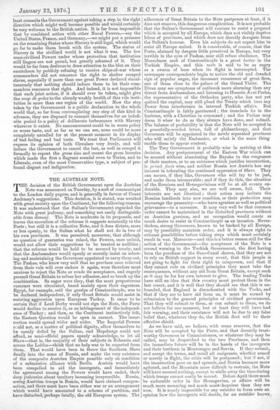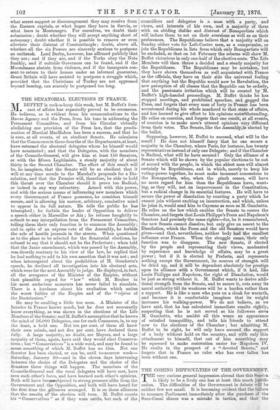THE AUSTRIAN NOTE.
THEdecision of the British Government upon the Austrian Note was announced on Tuesday, by a sort of communiqué to the London daily papers, and is generally in favour of Count Andrassy's suggestions. This decision, it is stated, was awaited with great anxiety upon the Continent, for the following reasons.
It was understood that the Sultan's Government regarded the Note with great jealousy, and something not easily distinguish- able from dismay. The Note is moderate in its proposals, and leaves the execution of the reforms it suggests nominally to the Porte ; but still it is a collective Note, and it does dictate, more or less openly, to the Sultan what he shall not do in two of his own provinces. It was perceived, moreover, that although no question of guarantee was raised, the Powers, once united, would not allow their suggestions to be treated as nullities ; that the reforms would be held to be secured by treaty, and that the Ambassadors would openly or secretly insist on select- ing and maintaining the Governors appointed to carry them out.
The Pashas, who know very well that no province once relieved from their ;ule will ever endure it again, were therefore most anxious to reject the Note or evade its acceptance, and eagerly pressed Great Britain to refuse her adhesion, and so break up the combination. So eager were they, that the most preposterous rumours were circulated, based mainly upon their eagerness.
Egypt, for example, said the gossips of Constantinople, was to be declared independent, if only Great Britain would assist in resisting aggression upon European Turkey. It came to be certain that if Lord Derby would not sign the Note, the Porte would decline to receive it, as an infringement of the independ- ence of Turkey ; and then, as the Continent instinctively felt, the Eastern Question would be open in earnest. The insur- rection would spread wider and wider. The Imperial Powers &mid not, as a matter of political dignity, allow themselves to be openly defied by the Sultan, and Hapsburgs could not afford, as semi-official papers openly acknowledge, to let all Slays—that is, the majority of their subjects in Bohemia and across the Leitha—think that no help was to be expected from them. That would have been to throw the Southern Slays finally into the arms of Russia, and make the very existence of the composite Austrian Empire possible only on condition of a submissive alliance with Berlin. Austria would have been compelled to aid the insurgents, and immediately the agreement among the Powers would have ended, their deep jealousies about territory becoming irrepressible. Russia, seeing Austrian troops in Bosnia, would have claimed compen- sation, and there must have been either war or an arrangement which would have amounted to a scheme of partition, and have-disturbed, perhaps fatally, the old European system. The adherence of Great Britain to the Note postpones at least, if it does not remove, this dangerous complication. It is not probable that the Sultan's Government will venture to resist a proposal which is accepted by all Europe, which does not visibly deprive Islam of provinces, and which does not directly derogate from the Sultan's honour. Even his subjects do not expect him to resist all Europe united. It is conceivable, of course, that the Porte, alarmed by dangers little perceived in Europe, but very terrible in the eyes of Pashas, may still refuse obedience. The Mussulman mob of Constantinople is a great factor in the Turkish Empire, and this mob is said to be as angry as a swarm of bees when its flight is intercepted. The newspaper correspondents begin to notice the old and dreaded sign of popular anger, the incessant recurrence of great fires, one of them close to the palace of the Grand Vizier. The Divan may see symptoms of outbreak more alarming than any threat from Ambassadors, and listening to Hussein Avni Pasha, the representative of the Orthodox party, who has not yet quitted the capital, may still plead the Treaty which bars any Power from interference in internal Turkish affairs. But Constantinople is fairly garrisoned ; the ironclads lie in the harbour, with a Christian in command ; and the Pashas may deem it wiser to do as they always have done, and submit. The balance of probability is that the Note will be accepted in a gracefully-worded letter, full of philanthropy, and that Governors will be appointed to the newly separated provinces who will satisfy the Embassies, or what is the same thing enable them to appear content.
The Tory Government is probably wise in arriving at this decision. Any postponement of the Eastern War which can be secured without abandoning the Rayahs to the vengeance of their masters, or to an existence which justifies insurrection, is prinui facie wise, and neither Russia nor Austria has any interest in tolerating the continued oppression of Slays. They can secure, if they like, Governors who will try to be just, and make them irremovable; and if they do this, the situation of the Bosnians and Herzegovinians will be at all events en- durable. They may also, we are well aware, fail. Their interests are not identical ; their action may irritate the Bosnian landlords into new cruelties, or their protection may encourage the peasantry—who have agrarian as well as political grievances—to a massacre. It may very well be that common order cannot be maintained in the disturbed provinces without an Austrian garrison, and an occupation would create as much desire to resist in Constantinople as an invasion. Never- theless, strong Governors, known to be backed by all Europe, may by possibility maintain order, and it is always right to exhaust possibilities before taking steps which must certainly result in war. Moreover—and this is a better reason still for the action of the Government—the acceptance of the Note is a second warning to the Turkish Government, the first having been the purchase of the Suez-Canal shares, that they are not to rely on British support in every event, that this people is not going to fight for their right to misgovern, and that if they cannot rule on civilised principles they must take the consequences, without any aid from Great Britain, except such as it may be for her own interest to give. The leading Turks have still an idea that this country must protect them in the last resort, and it is well that they should see that this is un- founded, that England is disenchanted with the Turks, and that if they are to have aid from us, it must be earned by submission to the general principles of civilised government. That they will submit to them, or can submit to them, we do not believe for one moment, but at least they will have had fair warning, and their resistance will not be due to any false belief that, whatever they do, the British fleet will be their effective shield.
As we have said, we believe, with some reserves, that the Note will be accepted by the Porte, and that decently trust- worthy Governors or Commissioners, or whatever they may be called, may be despatched to the two Provinces, and then the immediate future will be in the hands of the insurgents and their brethren in Montenegro and Servia. If they submit, and accept the terms, and recall all emigrants, whether armed or merely in flight, the crisis will be postponed ; but if not, if the insurrection goes on and spreads, and Servia becomes more agitated, and the Mountain more difficult to restrain, the Note will have secured nothing, except to while away the time during which troops cannot easily be moved. Before April there must be endurable order in the Herzegovina, or affairs will be much more menacing and much moniihopeless than they are now. It is nearly impossible for any outsider to form even an opinion how the insurgents will decide, for no outsider knows. what secret support or discouragement they may receive from the Eastern capitals, or what hopes they have in Servia, or what fears in Montenegro. For ourselves, we doubt their submission ; doubt whether they will accept anything short of autonomy; doubt whether it is possible to remove or even alleviate their distrust of Constantinople ; doubt, above all, whether all the six Powers are sincerely anxious to postpone an outbreak. Lord Derby, however, has affirmed publicly that they are ; and if they are, and if the Turks obey the Note frankly, and if suitable Governors can be found, and if the Mussulmans abstain from violence, and if the insurgents con- sent to return to their homes under an informal guarantee, Great Britain will have assisted to postpone a struggle which, provided that the Christians of Turkey are not oppressed beyond bearing, can scarcely be postponed too long.



































 Previous page
Previous page